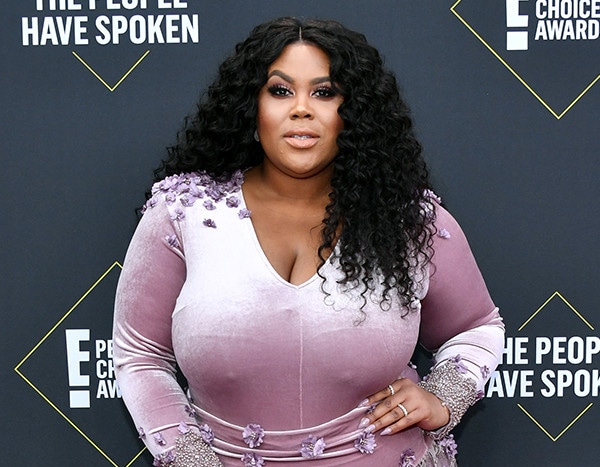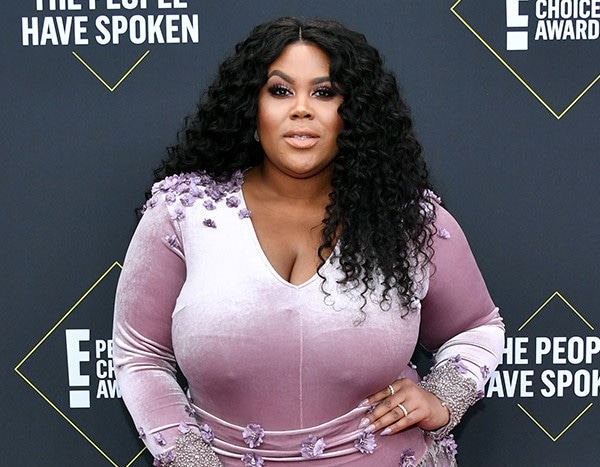
George Floyd‘s tragic death may have been the catalyst for the protests currently happening around the world, but for many—including E! host Nina Parker—the fight for justice extends beyond his case.
“This is not something that’s gonna be over in two weeks,” Parker told Ria Ciuffo and Fran Mariano on their Chicks in the Office podcast. “As we’ve talked about living with COVID-19, this is also something now…like, things are not gonna go back to normal. Our ‘normal’ that we had before this is done. So, you might as well get involved any way that you can because if you want things to get better, it’s gonna start, literally, with you.”
Parker has used her platform to speak out about Floyd’s death and longstanding issues like racism and police brutality, also providing Daily Pop and Nightly Pop viewers with resources and information that could help them get involved with organizations such as Black Lives Matter. But as she explained on the Barstool Sports podcast, it’s important that the allyship people are currently engaging in is maintained in the future.
“When we look at the history books, we look at the ’50s and ’60s when we were talking about integration and segregation and you see those posters and you see black people walking through this line and you see people yelling at them and pointing at them—this is like that!” Parker expressed. “Like, what side of history do you want to be on? When our kids look back and see this and you look like a fool ’cause you didn’t say something, or because you just didn’t want to create a wave, this is not the time.”
She continued, “This is complete civil unrest from generations of mistreatment, and if you think now is a time to be quiet and post about scones, I don’t know what to tell you.”
But it’s not too late to become an ally. Parker provided a starting point for those who aren’t sure what they can to help beyond signing petitions or donating to organizations.
“Like, what do you feel as a human being? You say what happens to George Floyd was unacceptable? Post it,” she said. “If you say, ‘I stand with everybody being treated equally and I stand against oppression,’ post that. Start simple. Start at the simplest place.”
Doing this, according to Parker, may result in expressions of contempt from followers, family members or friends; however, “that’s where you’re gonna get your strength from,” she added.
“If someone is racist and intent on misunderstanding you, they don’t give a s–t what you post. And that’s the point,” Parker explained, which, for her, also applies to those who counter “black lives matter” with “all lives matter.”
“I don’t understand…if all lives matter to people, why are you not as upset as I am? If my life matters as much as yours, why aren’t you more upset with how people are being treated?” Parker said. “So it’s obviously used to be divisive. And that’s what people are upset about. People aren’t upset about the words, people are upset about the way that it’s used to be divisive when people are saying, ‘Don’t kill us.'”
For Parker, recognizing this push-back as divisiveness is an important part of the fight for racial justice. She explained that she doesn’t want to “spend time trying to educate somebody who is committed to misunderstanding me when I could be better serving my community.” However, she also acknowledged that it’s sometimes important to engage with people challenging the notion of systemic racism.
“I think people see racism as one thing. I think there are a lot of people who haven’t experienced it, especially if they’re not a person of color—their interactions with racism have been minimal,” Parker expressed. “And they think racism means being a member of a white supremacist organization, burning a cross, saying the n-word…”
She continued, “What I need people to understand is that racism comes in many forms. And I think people have to be okay knowing they have internal bias. I think it’s okay to say, ‘You know what? I was looking at this with the wrong lens. I didn’t use the right words for this. I don’t know where my frustration is coming from. I don’t know why I crossed the street when this group of people walked by me.’ I think it’s okay to acknowledge that so we can deal with it.”
For example, if someone’s accused of racism, Parker doesn’t want their immediate response to be “I’m not racist! I don’t know what you’re talking about! That’s not me!”
“It doesn’t help the situation because you’re in this kind of denial of what you are contributing to society,” Parker emphasized. “And a lot of those microaggressions—like holding your purse when somebody comes in an elevator or wondering why someone was promoted and you weren’t, and questioning if they have the same qualifications as you—those are those microaggressions that contribute to this deeper misunderstanding.”
Another vital part of being an ally, Parker explained, is knowing when to decompress. She herself has struggled to do so this past week, especially since she feels “a responsibility to help keep people informed.”
With that in mind, she encouraged those who do want to educate themselves to put in the time and work to do so.
“I think it’s great to ask questions but I also think utilizing the resources we have. You know, we can find these silly videos on TikTok and Twitter, we should be able to find resources,” Parker said. “So, really even just searching hashtags can lead you to a place of information. People that you may be seeking information from are probably posting on their social media and posting links, so it’s really imperative to do the work. Because people may not have the energy to walk you through anything right now and it may not be personal, but don’t wait for anybody.”
Most importantly, she said, just use your voice.
“To think that your voice isn’t important—whether you got five followers or five million—is a disservice to not only you, but the people around you,” Parker added. “It’s never been more important.”
For more ways to take action and get involved, please click here.
